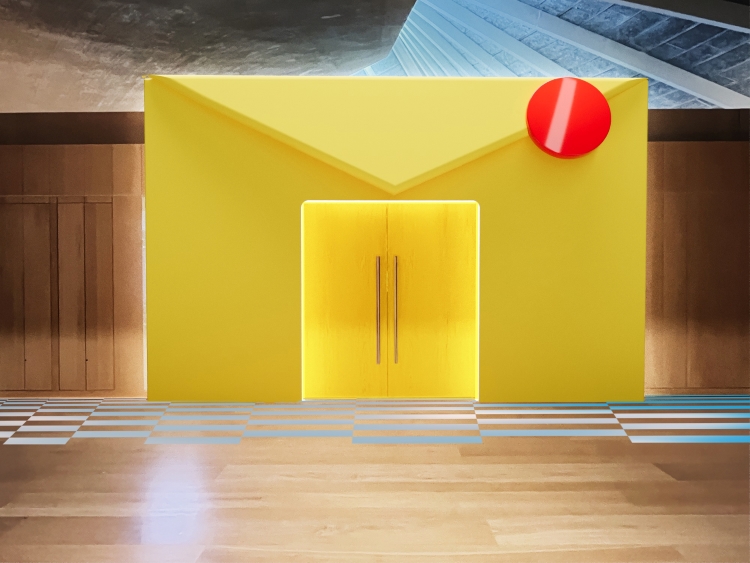New Design Museum Exhibition Will Tell the Story of Email
Email is Dead travels from the 1970s and the first networked email system to 2070, looking at how new technologies might influence communications.
Email is Dead – a new exhibition at the Design Museum London – is set to open on 28 September, interrogating the impact of email and the future of communication through inflatables and interactive experiences.
Intuit Mailchimp’s in-house creative team Wink led on the design, partnering with LA-based specialist experiential designer Something Special Studios (SSS) on the conceptual development and design, and with London-based production partner Event Concept. Mailchimp’s group creative director Christian Widlic says that after visiting the museum, he began thinking about what an exhibit on email might look like.
Widlic says that the most challenging, “yet exciting”, part of the project for the Wink team was “creating an artful exhibit about email that art-goers would actually want to check out”. He recognises that “email is not the most exciting thing on the planet” but describes the project as “creatively liberating and extremely fun”.

Far from dead, at more than 50 years old email has persevered as the primary form of communication across businesses worldwide, and is used by over four billion people, according to Statista. Widlic set out to explore “the influence of the inbox” and look deeper into how email has ingrained itself into our “work lives, relationships, cultures and economies”, he says.
The exhibition starts in the 1970s, with the “embryonic beginnings” of email, says Widlic. American computer programmer Ray Tomlinson invented and developed ARPANET’s networked email system in 1971 and, with evolutions in design and function, it has moved with us through various advancements in technological hardware to become email as we know it today.
From here, the exhibition takes the visitors on a journey of discovery through a series of “colourful, inflatable and interactive displays” in a bid to “make the mundane magnificent”, Widlic explains. The team delved into “what email smells, feels and sounds like”, using props and digital content on a variety of scales to execute this, he adds.
SSS adds that the “spatial intention was to create something approachable and playful”, and to “spark curiosity and interaction” while being inclusive for all ages.
Sound plays a significant role in the exhibition, with a soundtrack made up of “synthesized compositions that depict email’s daily routine” playing throughout, according to Widlic. It tracks an email’s journey from one sender to another in audio, from “swoosh, pop, and ding” to “type, click, and send”, he says.

One display invites visitors to bury their own “email time capsule”, says Widlic, while another involves taking an email personality test “to discover what kind of emailer they really are”. The exhibition also offers “imaginary and playful solutions” for relatable, real-life situations, such as “the dreaded piles of unanswered emails or the temptation to fire off an email that really shouldn’t be sent”, Widlic adds. These solutions come in the form of an Inbox Elixir and an Email Therapy Machine.
Looking beyond the present day as far as 2070, Email is Dead also speculates on the effect that technologies like artificial intelligence will have on email and what that future might look like.
According to SSS, the use of “imagery of the sky” and “inflating familiar icons”, sought to make the identity system recognisable as relating to email, while also speaking to its boundless potential”.

One of the challenges, according to Widlic, was that the design team had to avoid going too “internet” instead of “email”. The identity was designed using “a contemporary pixel pattern and email iconography” in a “3D sculptural way”, aiming to mimic the look and feel of the exhibition, he explains.
Email is Dead’s typeface is inspired by the first email ever sent in 1971 at BBN, while the colour palette uses Mailchimp’s cavendish yellow hue.
Written by: Abbey Bamford
Article source: designweek.co.uk
